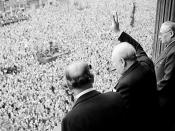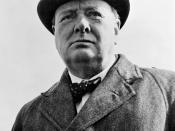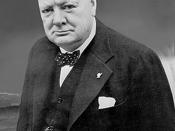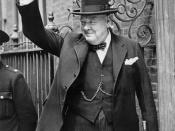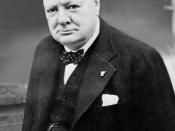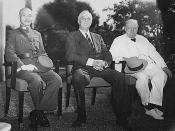Winston Churchill - During, After & Before the War.
Winston Churchill "ÃÂ before the war Winston Churchill has lived one of the most interesting and longest life of any person who has ever lived. Born at Blenheim Palace on November 30th, 1874, he lived a life of action, contreversy, setback and achievement until his death at Hyde Park Gate in London January 24th, 1965.
He fought in the army at Omdurman in 1898 and during the second Boer War was a correspondent for a London newspaper.
Switching from the conservative party to the Liberal party in 1904, he had a small rise through several high government posts in the British government.
Although now in a minority party which began in 1935 he warned the House of Commons of "self-preservation but also of the human and the world cause of the preservation of free governments and of Western civilization against the ever advancing sources of authority and despotism."
With the outbreak of Hitlers aggression in Europe, he was the only logical choice for Britain as Prime Minister, which he became in 1940 Winston Churchill "ÃÂ During the war Winston Churchill was raised to Prime Minister on May 10th, 1940 "ÃÂ the day that the German Blitzkrieg started in the West. After only six weeks of fighting Europe was under the control of the Third Reich while British and Allied troops desperately tried to retreat from Dunkirk. This retreat was made famous by the 650 non-military vessels owned by British civialians which made many crossings of the channel in terrible conditions and often under heavy bombing and artillery fire.
Winston Churchill himself said that he felt all previous experiences and times in his life were preperation for this "ÃÂ fighting alone with Britain against the tide of the Third Reich.
Instead of accepting a peace offer from Adolf Hitler, Winston Churchill quickly organised the Royal British Air Force for the defence against the Luftwaffe. These organisations and actions eventually led to the victory of the Battle of Britain and the famous speech made by Churchill which states "Never before in the field of human conflict was so much owed by so many, to so few."ÃÂ After the Battle of Britain he sent the majority of the British forces to the Middle East to oppose Hitlers Italian ally, Mussolini, joining with other Allied forces to crush the Axis threat.
Winston Churchill worked closely with Franklin Roosevelt to secure allied participation and support in the war effort.
Winston Churchill "ÃÂ After the War Although defeated after the war in the 1945 elections he remained a pugnacious leader of the opposition party and was elected again in 1951 to be Prime Minister, where he remained until his health forced him to resign in 1955.
Winston Churchill is often described as "the greatest living Englishman"ÃÂ and he achieved worldwide fame as a military strategist and brilliant orator. He was perhaps one of the last remaining masters of the English language and his magnificent speeches during the height of the Nazi threat inspired people worldwide. In addition to his military and political skills, Churchill excelled in a wide variety of areas, including painting, writing and in his grasp of history. He was knighted in 1953, and awarded the Nobel Prize for Literature in the same year.
